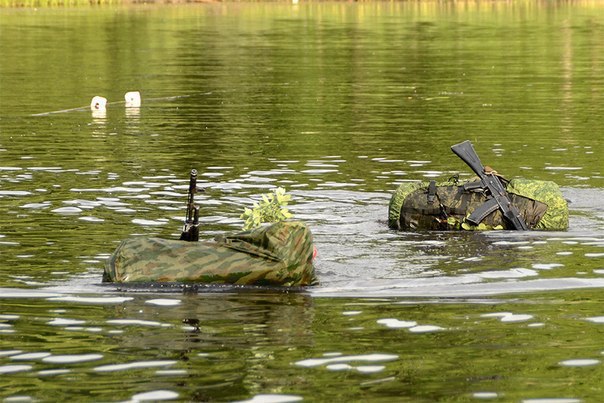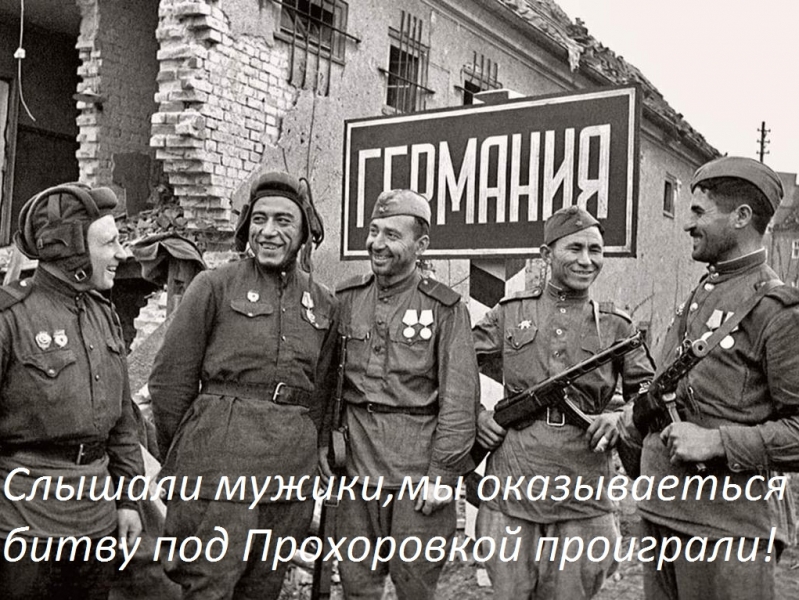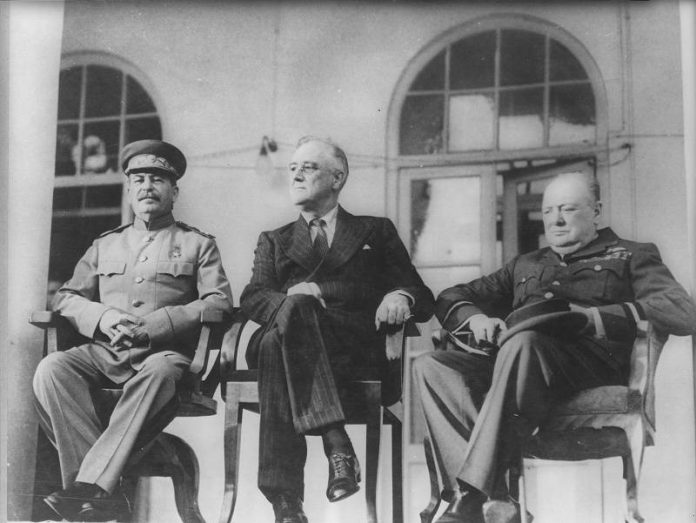 Leaders of the countries of the anti-Hitler coalition during the Tehran conference 28 November—December 1 1943 of the year.
Leaders of the countries of the anti-Hitler coalition during the Tehran conference 28 November—December 1 1943 of the year.
From left to right: Chairman of the Council of People's Commissars of the USSR I.V.. Stalin, US President F.D.. Roosevelt and British Prime Minister. Churchill.
75 years ago, 28 November 1943 of the year, Tehran Conference opens. This was the first meeting of the Big Three during World War II. — heads of the three great powers of the USSR, US and UK: Joseph Stalin, Franklin Delano Roosevelt and Winston Churchill.
prehistory
The leaders of the great powers gathered in Tehran to resolve a number of difficult issues, related to the continuation of the war against Nazi Germany, post-war structure of Europe, and the entry of the USSR into the war with Japan. In Western Europe, there was nowhere or dangerous to hold a meeting of the "Big Three". The Americans and the British did not want to hold a conference on Soviet territory either.. In August 1943 Roosevelt and Churchill told Stalin, what, in their opinion, neither Arkhangelsk is suitable for such a conference, nor Astrakhan. They offered to meet in Alaska, in Fairbanks.
But Stalin refused to leave Moscow for such a long distance at such a tense time.. The Soviet leader proposed to hold a meeting in the state, where there were representations of all three powers, eg, in Iran. Beyond Tehran, Cairo was considered as the "capitals of the conference" (proposed by Churchill), Istanbul and Baghdad. But stopped in Tehran, since at that moment it was controlled by Soviet and British troops, the American contingent was here.
Iranian operation (Operation Consent) Anglo-Soviet troops held in late August - the first half of September 1941 of the year. Allied forces occupied Iran due to a number of military-strategic and economic considerations (). So, the Iranian leadership in the pre-war years actively cooperated with the Third Reich, in Persia, the ideology of Iranian nationalism was gaining strength. As a result, there was a real threat of involving Iran on the side of Germany as an ally in World War II and the appearance of German troops here.. Iran became the base of German intelligence, what threatened the interests of Great Britain and the USSR in the region. There was a need to take control of Iranian oil fields, preventing their possible capture by the Germans. Besides, The USSR and Great Britain created the southern transport corridor, according to which the allies could support Russia as part of the lend-lease program.
Parts of the Red Army occupied Northern Iran. The intelligence departments of the Soviet 44th and 47th armies carried out active work to eliminate German agents. British troops occupied the southwestern provinces of Iran. American troops, under the pretext of cargo protection, supplied to the Soviet Union, entered Iran at the end 1942 of the year. Without any formalities, the Americans occupied the ports of Bandar Shahpur and Khorramshahr. Important communications passed through Iranian territory, through which American strategic cargo was transferred to the USSR.
In general, the situation in Iran was, albeit difficult, but controlled. The Soviet 182nd Mountain Rifle Regiment was stationed in the Iranian capital, who guarded the most important objects (before the start of the conference, it was replaced by a more prepared part). Most ordinary Persians treated the Soviet people with respect. This facilitated the actions of Soviet intelligence, which easily found volunteer helpers among the Iranians.
Stalin refused to fly by plane and went to a conference 22 November 1943 year on letter train No. 501, which proceeded through Stalingrad and Baku. Beria was personally responsible for traffic safety, he rode in a separate carriage. The delegation also included Molotov, Voroshilov, Stemenko, relevant employees of the People's Commissariat for Foreign Affairs and the General Staff. They flew from Baku on two planes. The first was controlled by an ace pilot, Commander of the 2nd Special Purpose Air Division Viktor Grachev, Stalin flew on the plane, Molotov and Voroshilov. Long-range aviation commander Alexander Golovanov personally flew the second aircraft.
Churchill left London for Cairo, where the American president was waiting, to once again agree on the positions of the United States and England on the main issues of negotiations with the Soviet leader. Roosevelt crossed the Atlantic on the battleship Iowa, accompanied by a significant escort.. They managed to avoid a collision with German submarines. After a nine-day sea passage, the American squadron arrived in the Algerian port of Oran. Roosevelt then arrived in Cairo. 28 November, the delegations of the three great powers were already in the Iranian capital.
Due to the threat from German agents, large-scale measures were taken to ensure the safety of high-ranking guests. The government delegation of the USSR stopped at the territory of the Soviet embassy. The British settled on the territory of the British embassy. The British and Soviet diplomatic missions were located on opposite sides of the same street in the Iranian capital, no more than 50 m. The American President, due to terrorist threat, accepted an invitation to settle in the building of the Soviet embassy.
The American embassy was on the outskirts of the city, which seriously impaired the ability to create a tight security ring. The meetings were held at the Soviet embassy, where Churchill walked along a specially built covered corridor, uniting the Soviet and British missions. Around the Soviet-British diplomatic complex united by this "security corridor", Soviet and British intelligence agencies created three rings of enhanced security, reinforced by armored vehicles. All press in Tehran stopped its activities, phone was turned off, telegraph and radio communication.
Germany, relying on numerous agencies, tried to organize an assassination attempt on the leaders of the "Big Three" (Operation Long Jump). However, Soviet intelligence knew about this operation.. In addition, Soviet intelligence officers, together with their British counterparts from MI6, took direction and decoded all messages from German radio operators., who were preparing a bridgehead for the landing of a sabotage group. German radio operators intercepted, and then they took the entire German intelligence network (more 400 human). Some of them were turned over. The assassination attempt on the leaders of the USSR, USA and England was prevented.
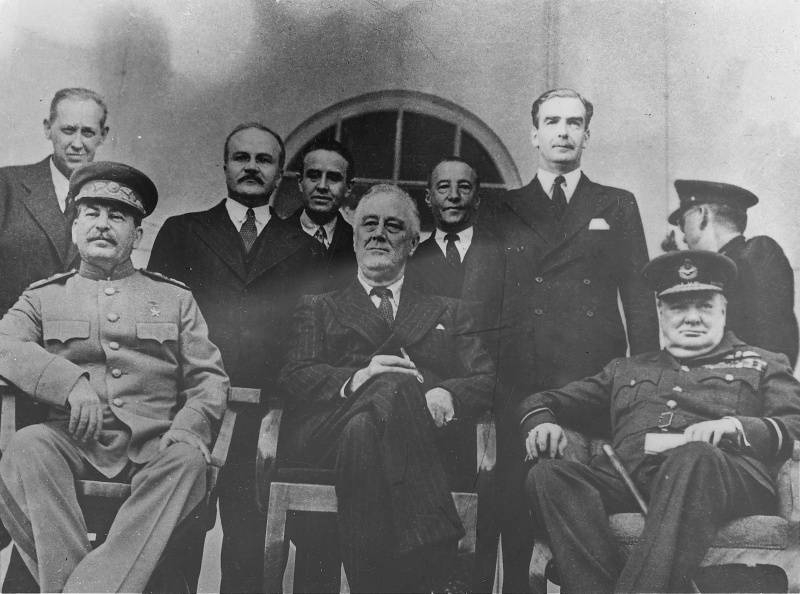 Soviet leader Joseph Vissarionovich Stalin, US President Franklin Roosevelt and British Prime Minister Winston Churchill.
Soviet leader Joseph Vissarionovich Stalin, US President Franklin Roosevelt and British Prime Minister Winston Churchill.
Standing left to right: US Presidential Advisor Harry Hopkins, People's Commissar for Foreign Affairs of the USSR Vyacheslav Mikhailovich Molotov. Second from right is British Foreign Secretary Anthony Eden.. Photo source: http://waralbum.ru/
Conversation
Among the most important questions, that were discussed in Tehran were:
1. the problem of opening the "second front" by the allies. This was the hardest question.. England and the United States in every possible way delayed the opening of a second front in Europe. In addition, Churchill wanted to open the "Balkan Front", with Turkey, to advancing through the Balkans, cut off the Red Army from the most important centers of Central Europe;
2. the Polish question - about the borders of Poland after the war;
3. the question of the entry of the USSR into the war with the Empire of Japan;
4. question of Iran's future, granting him independence;
5. questions of the post-war structure of Europe — primarily decided the fate of Germany and the security of the world after the war.
The main problem was the decision to open t. n. "second front", that is, the landing of Allied troops in Europe and the creation of the Western Front. This should have greatly accelerated the fall of Germany. After the strategic turning point in the Great Patriotic War, which occurred during the battles of Stalingrad and Kursk, position in the East (Russian) front developed favorably for the Red Army. German troops suffered irreparable losses and could no longer make up for them., and the German military-political leadership lost the strategic initiative in the war. Wehrmacht switched to strategic defense.
The Red Army pressed the enemy. However, victory was still far away., The Third Reich was still a formidable adversary with powerful armed forces., strong industry. The Germans controlled the vast territories of the USSR and Eastern, Southeast, Central and Western Europe. It was possible to accelerate the defeat of Germany and its allies only by the joint efforts of the three great powers.
The Allies promised to open a second front back in 1942 year, but a year has passed, and there were no moves. Militarily, the Allies were ready to start the operation by July-August. 1943 of the year, when a fierce battle took place on the Oryol-Kursk Bulge on the Eastern Front. 500,000 were deployed in England. expeditionary army, which was in full combat readiness, She was provided with everything she needed., including ships and vessels for combat cover, fire support and landings. However, the front was not opened for geopolitical reasons.. London and Washington were not going to help Moscow. Soviet intelligence discovered, what in 1943 the Allies will not open a second front in northern France. They will be waiting, "until Germany is mortally wounded by the Russian offensive".
It must be remembered, what London and Washington were the instigators of World War II. They raised Hitler, let the Nazis take over, restore the military and economic power of the Reich, allowed Berlin to subdue most of Europe. The Third Reich was a "ram" of the masters of the West to crush the Soviet civilization. London in secret negotiations promised Hitler, that there will be no "second front", if Germany goes on a "crusade to the East". Hence the wait-and-see policy of England and the USA in 1941 – 1943 gg.
The masters of the West planned, that Germany will be able to crush the USSR, but during this duel of the titans will be weakened, which will allow the Anglo-Saxons to appropriate all the fruits of victory in the world war. Only after, as it became obvious, that Nazi Germany will not be able to defeat Russia-USSR, London and Washington rushed to strengthen the alliance with Moscow, to be in the camp of the winners in the scenario, where the Russians win the war.
Moreover, it became known, that London and Washington developed a strategic plan for an offensive from the south, on the outskirts of Italy and the Balkan Peninsula. They planned to withdraw Italy from the war, having held behind-the-scenes talks with Italian politicians. Force Turkey to come out on its side and with its help open the way to the Balkans, launching an offensive in the fall. And wait until autumn, look, what is happening on the Russian front.
The Anglo-American leadership believed, that the Germans in the summer 1944 launched a new strategic offensive on the Eastern Front, but after some success will be stopped again and discarded. Germany and the USSR will suffer huge losses, bleed their armed forces. At the same time, plans were being developed for the landing of allied troops in Sicily., Greece and Norway.
In this way, the masters of the West waited until the last moment, that the USSR and Germany will be bled dry during a titanic battle. This will allow England and the United States to act from a position of strength and dictate the terms of the post-war world order..
The United States and Britain wanted to convince the USSR that, that the landing in the north of France was complicated by a lack of transport, which makes it impossible to supply large military formations. Drawing Turkey into the war and an offensive through the Balkan Peninsula is a more profitable scenario, which will allow the allies to connect on the territory of Romania and strike at Germany from the south.
In this way, Churchill wanted to cut off most of Europe from the USSR. Besides, the pace of war slowed down, Germany was no longer threatened in the central strategic direction. This made it possible to work out new anti-Soviet scenarios and weaken the significance of the Red Army at the final stage of the war., when the fighting will go on German territory. In particular , the scenario of the anti-Hitler coup in Germany was being worked out, when the new German leadership realizes the hopelessness of the situation, capitulates and releases Anglo-American troops, to save the country from the Red Army.
After the war, they planned to create an anti-Soviet buffer from regimes hostile to the USSR in Finland, Baltic, Poland, Romania, new Germany. In addition, the allies hid their nuclear project from Moscow., which was not directed against the Third Reich and was supposed to make the Anglo-Saxons full masters of the planet after the end of World War II. However, Moscow knew about it too., and prepared response moves.
After a long debate, the problem of opening a second front was at an impasse.. Then Stalin expressed his readiness to leave the conference: "We have too much to do at home, to waste time here. Nothing good, As I can see, does not work". Churchill understood, that it is impossible to heat up the question anymore, made a compromise. Roosevelt and Churchill promised the Soviet leader to open a second front in France no later than May 1944 of the year. The final time of the operation was planned to be determined in the first half 1944 g.
To mislead the German command regarding the place and the beginning of the landing of the Anglo-American troops in Western Europe, it was planned to conduct an amphibious operation in southern France. Soviet troops during the Allied operation were to launch an offensive, to prevent the transfer of German troops from east to west. The allies also agreed to take measures to assist the Yugoslav partisans.
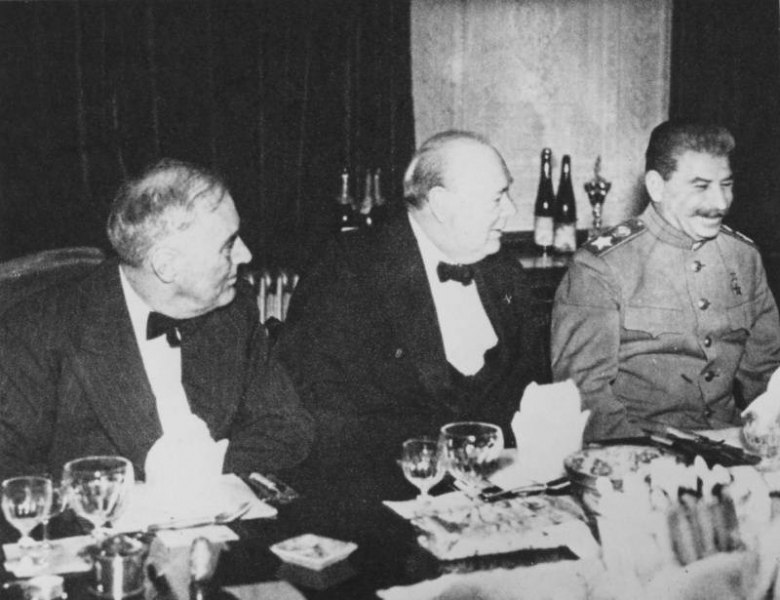 AND. Stalin, IN. Churchill and F. Roosevelt at a banquet during the Tehran Conference. In the photo in the lower right corner, there is a cake with candles on the table. — 30.11.1943 g. Churchill celebrated his 69th birthday in Tehran.
AND. Stalin, IN. Churchill and F. Roosevelt at a banquet during the Tehran Conference. In the photo in the lower right corner, there is a cake with candles on the table. — 30.11.1943 g. Churchill celebrated his 69th birthday in Tehran.
The future of Poland has also caused serious controversy.. However, a preliminary agreement was reached on, that the eastern border of the Polish state will pass along the "Curzon Line". This line basically corresponded to the ethnographic principle: to the west of it were territories with a predominance of the Polish population, to the east - lands with a predominance of Western Russian and Lithuanian populations. It was decided to satisfy the territorial appetites of Warsaw at the expense of Germany (Prussia), which in the Middle Ages occupied significant Polish lands. Stalin rejected the claims of Roosevelt and Churchill for the recognition by Moscow of the Polish government in exile in London. The US and England planned to plant their puppets in Poland. Moscow did not go for it and stated, that the USSR separates Poland from the government in exile in England.
The Big Three adopted a "Declaration on Iran". The document emphasized Moscow's desire, Washington and London to preserve the sovereignty and territorial integrity of Iran. It was planned to withdraw the occupying troops after the end of the war. Need to say, that Stalin was not going to leave Iran in the clutches of the Anglo-Saxons. During his stay in Tehran, Stalin studied the general condition of the Iranian political elite, influence of the British, got acquainted with the state of the army. It was decided to organize aviation and tank schools, give them technology, to organize the training of Iranian personnel.
During the discussion of the post-war structure of Europe, the American president proposed to dismember Germany after the war into 5 autonomous state entities and establish international control (in fact England and the USA) behind the most important German industrial regions - the Ruhr, Saar and others. Churchill supported him. Besides, Churchill proposed to create. n. "Danubian Federation" from the Danubian countries, including the South German territories. In practice, Germany was offered to return to the past - to dismember it. This laid a real "mine" under the future structure of Europe.
However, Stalin did not agree with this decision and proposed that the German question be referred to the European Consultative Commission.. The USSR, as a contribution, received the right after the victory to annex part of East Prussia. In the future, Stalin remained in the position of maintaining the unity of Germany. In this way, Germany should be grateful to Russia for maintaining the unity of the state and people.
US President Roosevelt proposed the creation of an international organization (this issue has already been discussed with Moscow) on the principles of the United Nations. This organization was supposed to ensure a lasting peace after World War II.. To the committee, which was supposed to prevent the start of a new war and aggression from Germany and Japan, included the USSR, USA, Great Britain and China. Stalin and Churchill generally supported this idea..
Agreed on the Japanese issue. Soviet delegation, taking into account repeated violations by the Empire of Japan of the Soviet-Japanese treaty 1941 years of neutrality and assistance to Germany (plus the need for historical revenge for 1904 – 1905 gg.), as well as going to meet the wishes of the allies, He stated, that the USSR would go to war with Japan after the final defeat of the Third Reich.
In this way, Stalin won a landslide diplomatic victory at the Tehran Conference. He did not allow the “allies” to push through the “southern strategy” - the Allied offensive through the Balkans, forced the allies to promise to open a second front. The Polish issue was resolved in the interests of Russia - the restoration of Poland was at the expense of ethnically Polish regions, once occupied by the Germans. Emigrant Polish government, which was "under the hood" from England and the USA, Moscow did not recognize.
Stalin did not allow to kill and dismember Germany, which was a historical injustice and created a zone of instability on the western borders of the USSR. Moscow benefited from neutral, united German state as a counterbalance to England and France. In Japan, Stalin allowed himself to be "persuaded", but, in fact, a lightning operation against the Japanese was in the strategic interests of Russia-USSR. Stalin took the historical revenge of Russia for the war 1904-1905 gg., returned lost territories and strengthened the military-strategic and economic positions of the USSR in the Asia-Pacific region. The Soviet Union during the war with Japan received powerful positions on the Korean Peninsula and in China.







